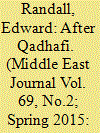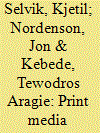| Srl | Item |
| 1 |
ID:
137841


|
|
|
|
|
| Summary/Abstract |
This article examines Libya's troubled transition from Mu'ammar al-Qadhafi's authoritarian regime. The author asks what past transitions tell us about possible positive pathways from authoritarian rule and what Libya can learn from its previous failures in development in order to shed light on why Libya is struggling in its transition from regime change to economic and political development. The article concludes by identifying Libya's uniqueness with its “shallow state,” its deep regional and tribal rivalries, and distributive economy, which together are currently incapacitating progress towards sustainable development.
|
|
|
|
|
|
|
|
|
|
|
|
|
|
|
|
| 2 |
ID:
137843


|
|
|
|
|
| Summary/Abstract |
This article explores how geographical forms of Israel/Palestine are represented in maps sketched by high school students. The results show that they are significantly different from the geopolitical map, demonstrating the unique ways through which these students think about the national territory. The paper probes two sources that feed into the country's geographical image: its ongoing politics of treating boundaries as potential frontiers, and the school curriculum, which conveys a double message regarding borders. This image of a blurred geo-body invites for creative resolutions of the Israeli-Palestinian conflict.
|
|
|
|
|
|
|
|
|
|
|
|
|
|
|
|
| 3 |
ID:
137842


|
|
|
|
|
| Summary/Abstract |
For decades, Iran has supported the regime of Bashar al-Asad in Syria with military advisors, weapons, and both diplomatic and financial support due to Tehran's belief that a pro-Iranian government in Syria is a core national interest. In this regard, cooperation with Damascus has provided Tehran with a number of strategic advantages, which it is loath to surrender. More recently, the Iranians have also come to view Syria as a vital ally against the threat of the Islamic State in Iraq and al-Sham (ISIS). In this environment, the Islamic Republic will likely continue to bolster the Asad regime even if the Syrian civil war continues for years.
|
|
|
|
|
|
|
|
|
|
|
|
|
|
|
|
| 4 |
ID:
137840


|
|
|
|
|
| Summary/Abstract |
The July 2012 parliamentary election in Libya was free and fair. Nonetheless, the election exacerbated various local, tribal, and religious cleavages. The National Transitional Council's policy of appeasement successfully averted widespread armed conflict, yet it inadvertently derailed Libya's future constitutional process. This article surveys the main scholarly paradigms for analyzing both Libya after the fall of Mu'ammar al-Qadhafi and the role of elections in societies in transition. It concludes that the outcome of the 2012 Libyan election calls into question the ability of post-conflict elections to function as tools of democratization or as mechanisms to unify social fissures, especially in societies lacking in formal institutions.
|
|
|
|
|
|
|
|
|
|
|
|
|
|
|
|
| 5 |
ID:
137844


|
|
|
|
|
| Summary/Abstract |
The article discusses the political effect of print media liberalization in Kuwait based on content analysis of Arabic language newspapers in the 2009 parliamentary election. The analysis found no systematic favoring of pro-government candidates in electoral coverage, but did find a statistically significant bias for candidates from the ruling, non-Bedouin hadari class, at the expense of the Bedouin tribal population. This article points to there being structural obstacles to democracy in Kuwait that cannot be overcome only by the liberalization of the press through legislation.
|
|
|
|
|
|
|
|
|
|
|
|
|
|
|
|